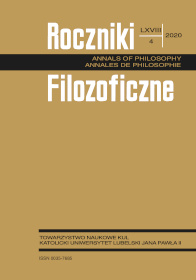Where do the Substantial Forms Come From?—A Polemic with the Theistic Evolutionism of Mariusz Tabaczek
Abstract
Contemporary Thomists strive to demonstrate a compatibility between Aristotelian-Thomistic metaphysics and the theory of biological macroevolution. Recently such positions have been promoted by Dr Mariusz Tabaczek. However, he admits that Aquinas’s teachings need to be substantially modified to make them compatible with theistic evolution. On his view, the main point of controversy is whether the creation of the world has been completed (as Aquinas maintains) or it continues (as it is required by theistic evolution). But the evolutionary postulate of continual creation understood as emergence of totally new substantial forms contradicts not only Aquinas’s doctrine but the classic Christian understanding of creation. Thomistic evolutionists cannot explain the origin of new substantial forms; they refer to accidental changes, such as random genetic mutations, whose accumulation over time would produce new species. This, however, is not possible in the light of Thomistic metaphysics because an accidental change does not produce a substantial change. Additionally, the Thomistic evolutionist concept does not tally with many facts discovered by contemporary science. Thomistic evolutionists abandon the fundamental concepts of Aquinas’s philosophy such as the substance-accidents fold and moderate realism as a cognitive attitude. Hence the conclusion that it is not possible to reconcile biological macroevolution with Aquinas’s teachings.
References
Austriaco, Nicanor P. G. „In Defense of Thomistic Evolution: A Response to Chaberek”. Public Discourse, 7.03.2018. Dostęp 16.12.2019. https://www.thepublicdiscourse.com/2018/03/20975.
Austriaco, Nicanor P. G., James Brent, Thomas Davenport, John B. Ku. Ewolucja w świetle wiary. Perspektywa tomistyczna. Poznań: W drodze, 2019.
Axe, Douglas D. „Estimating the Prevalence of Protein Sequences Adopting Functional Enzyme Folds”. Journal of Molecular Biology 341, nr 5 (2004): 1295–1315.
Axe, Douglas D., and Anne K. Gauger. „The Evolutionary Accessibility of New Enzyme Functions: A Case Study from the Biotin Pathway”. Bio-complexity, nr 1 (2011): 1–17.
Behe, Michael J. Darwin Devolves. New York: HarperOne, 2019.
Behe, Michael J. Darwin’s Black Box. New York: Free Press 1996.
Behe, Michael J. The Edge of Evolution. New York: Free Press 2008.
Chaberek, Michał. „Classical Metaphysics and Theistic Evolution—Why Are They Incompatible?”. W: Studia Gilsoniana 8, nr 1 (2019): 47–81.
Chaberek, Michał. „Pochodzenie człowieka. O filozoficznych problemach hominizacji”. W: Spór o początek i koniec życia ludzkiego, 221–255. Lublin: Polskie Towarzystwo Św. Tomasza z Akwinu, 2015.
Chaberek, Michał. Św. Tomasz z Akwinu a ewolucja. Kęty: Marek Derewiecki, 2019.
Chaberek, Michał. „The Five Arguments Stand: Response to a Critic on Aquinas and Evolution”. Evolution News & Science Today. Dostęp 16.12.2019. https://evolutionnews.org/2018/05/the-five-arguments-stand-response-to-a-critic-on-aquinas-and-evolution.
Chaberek, Michał. „Tomasz z Akwinu a teistyczny ewolucjonizm”. W: Zeszyty Naukowe KUL 59, nr 1 (2016): 59–82.
De Koninck, Charles. „The Cosmos. The Philosophic Point of View”. W: The Writings of Charles De Koninck, red. i tłum. Ralph McInerny, 1:256–321. Indiana: University of Notre Dame Press, 2008.
Meyer, Stephen C. Darwin’s Doubt: The Explosive Origin of Animal Life and the Case for Intelligent Design. New York: HarperOne, 2013.
Tabaczek, Mariusz. Posłowie do Nicanor P. G. Austriaco, James Brent, Thomas Davenport, John B. Ku, Ewolucja w świetle wiary. Perspektywa tomistyczna, 225–241. Poznań: W drodze 2019.
Copyright (c) 2020 Roczniki Filozoficzne

This work is licensed under a Creative Commons Attribution-NonCommercial-NoDerivatives 4.0 International License.





